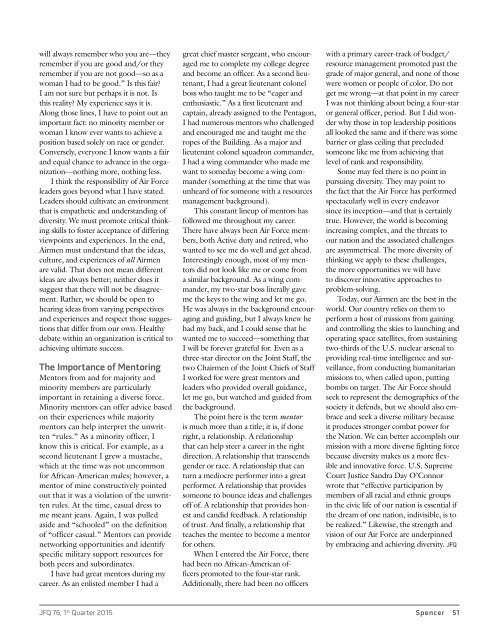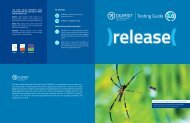jfq-76
jfq-76
jfq-76
Create successful ePaper yourself
Turn your PDF publications into a flip-book with our unique Google optimized e-Paper software.
will always remember who you are—they<br />
remember if you are good and/or they<br />
remember if you are not good—so as a<br />
woman I had to be good.” Is this fair?<br />
I am not sure but perhaps it is not. Is<br />
this reality? My experience says it is.<br />
Along those lines, I have to point out an<br />
important fact: no minority member or<br />
woman I know ever wants to achieve a<br />
position based solely on race or gender.<br />
Conversely, everyone I know wants a fair<br />
and equal chance to advance in the organization—nothing<br />
more, nothing less.<br />
I think the responsibility of Air Force<br />
leaders goes beyond what I have stated.<br />
Leaders should cultivate an environment<br />
that is empathetic and understanding of<br />
diversity. We must promote critical thinking<br />
skills to foster acceptance of differing<br />
viewpoints and experiences. In the end,<br />
Airmen must understand that the ideas,<br />
culture, and experiences of all Airmen<br />
are valid. That does not mean different<br />
ideas are always better; neither does it<br />
suggest that there will not be disagreement.<br />
Rather, we should be open to<br />
hearing ideas from varying perspectives<br />
and experiences and respect those suggestions<br />
that differ from our own. Healthy<br />
debate within an organization is critical to<br />
achieving ultimate success.<br />
The Importance of Mentoring<br />
Mentors from and for majority and<br />
minority members are particularly<br />
important in retaining a diverse force.<br />
Minority mentors can offer advice based<br />
on their experiences while majority<br />
mentors can help interpret the unwritten<br />
“rules.” As a minority officer, I<br />
know this is critical. For example, as a<br />
second lieutenant I grew a mustache,<br />
which at the time was not uncommon<br />
for African-American males; however, a<br />
mentor of mine constructively pointed<br />
out that it was a violation of the unwritten<br />
rules. At the time, casual dress to<br />
me meant jeans. Again, I was pulled<br />
aside and “schooled” on the definition<br />
of “officer casual.” Mentors can provide<br />
networking opportunities and identify<br />
specific military support resources for<br />
both peers and subordinates.<br />
I have had great mentors during my<br />
career. As an enlisted member I had a<br />
great chief master sergeant, who encouraged<br />
me to complete my college degree<br />
and become an officer. As a second lieutenant,<br />
I had a great lieutenant colonel<br />
boss who taught me to be “eager and<br />
enthusiastic.” As a first lieutenant and<br />
captain, already assigned to the Pentagon,<br />
I had numerous mentors who challenged<br />
and encouraged me and taught me the<br />
ropes of the Building. As a major and<br />
lieutenant colonel squadron commander,<br />
I had a wing commander who made me<br />
want to someday become a wing commander<br />
(something at the time that was<br />
unheard of for someone with a resources<br />
management background).<br />
This constant lineup of mentors has<br />
followed me throughout my career.<br />
There have always been Air Force members,<br />
both Active duty and retired, who<br />
wanted to see me do well and get ahead.<br />
Interestingly enough, most of my mentors<br />
did not look like me or come from<br />
a similar background. As a wing commander,<br />
my two-star boss literally gave<br />
me the keys to the wing and let me go.<br />
He was always in the background encouraging<br />
and guiding, but I always knew he<br />
had my back, and I could sense that he<br />
wanted me to succeed—something that<br />
I will be forever grateful for. Even as a<br />
three-star director on the Joint Staff, the<br />
two Chairmen of the Joint Chiefs of Staff<br />
I worked for were great mentors and<br />
leaders who provided overall guidance,<br />
let me go, but watched and guided from<br />
the background.<br />
The point here is the term mentor<br />
is much more than a title; it is, if done<br />
right, a relationship. A relationship<br />
that can help steer a career in the right<br />
direction. A relationship that transcends<br />
gender or race. A relationship that can<br />
turn a mediocre performer into a great<br />
performer. A relationship that provides<br />
someone to bounce ideas and challenges<br />
off of. A relationship that provides honest<br />
and candid feedback. A relationship<br />
of trust. And finally, a relationship that<br />
teaches the mentee to become a mentor<br />
for others.<br />
When I entered the Air Force, there<br />
had been no African-American officers<br />
promoted to the four-star rank.<br />
Additionally, there had been no officers<br />
with a primary career-track of budget/<br />
resource management promoted past the<br />
grade of major general, and none of those<br />
were women or people of color. Do not<br />
get me wrong—at that point in my career<br />
I was not thinking about being a four-star<br />
or general officer, period. But I did wonder<br />
why those in top leadership positions<br />
all looked the same and if there was some<br />
barrier or glass ceiling that precluded<br />
someone like me from achieving that<br />
level of rank and responsibility.<br />
Some may feel there is no point in<br />
pursuing diversity. They may point to<br />
the fact that the Air Force has performed<br />
spectacularly well in every endeavor<br />
since its inception—and that is certainly<br />
true. However, the world is becoming<br />
increasing complex, and the threats to<br />
our nation and the associated challenges<br />
are asymmetrical. The more diversity of<br />
thinking we apply to these challenges,<br />
the more opportunities we will have<br />
to discover innovative approaches to<br />
problem-solving.<br />
Today, our Airmen are the best in the<br />
world. Our country relies on them to<br />
perform a host of missions from gaining<br />
and controlling the skies to launching and<br />
operating space satellites, from sustaining<br />
two-thirds of the U.S. nuclear arsenal to<br />
providing real-time intelligence and surveillance,<br />
from conducting humanitarian<br />
missions to, when called upon, putting<br />
bombs on target. The Air Force should<br />
seek to represent the demographics of the<br />
society it defends, but we should also embrace<br />
and seek a diverse military because<br />
it produces stronger combat power for<br />
the Nation. We can better accomplish our<br />
mission with a more diverse fighting force<br />
because diversity makes us a more flexible<br />
and innovative force. U.S. Supreme<br />
Court Justice Sandra Day O’Connor<br />
wrote that “effective participation by<br />
members of all racial and ethnic groups<br />
in the civic life of our nation is essential if<br />
the dream of one nation, indivisible, is to<br />
be realized.” Likewise, the strength and<br />
vision of our Air Force are underpinned<br />
by embracing and achieving diversity. JFQ<br />
JFQ <strong>76</strong>, 1 st Quarter 2015 Spencer 51




